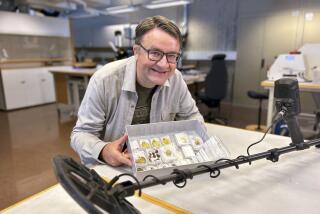Faeroe Islands’ Boom Times Wash Away : Europe: Archipelago in the North Sea prospered with its rich fishing grounds. But a collapse has left residents saddled with debt, social problems.
- Share via
TORSHAVN, Faeroe Islands — Like the fog that often envelops their weathered landscape, an economic and social crisis has crept over the islands that once seemed like an oasis amid the ills of Europe.
An economic boom in the early 1980s has yielded to recession in the semi-independent Danish territory, a North Sea archipelago of striking fjords 250 miles north of Britain.
Jobs are no longer plentiful. Drug and crime problems are growing. Money is tight, and young people are emigrating. The good times are over in the Faeroes.
“We lived on borrowed money without thinking of what tomorrow would bring,” Premier Marita Petersen said.
Rich fishing grounds in the North Atlantic helped bring prosperity to the 41,000 Faeroese, who are outnumbered by the 70,000 sheep and millions of birds on their 18 islands.
The territorial legislature won huge subsidies from Denmark, using much of the money to build roads, tunnels and bridges along the fjords to link the shorelines to hamlets on the sheer cliffs above.
Borrowed money bought fishing boats and new houses. Satellite dishes sprouted from the grass-covered roofs of wooden cottages painted yellow, green or blue. New Japanese cars became commonplace, stores were well supplied and video shops offered the latest American hits.
Then, in the mid-1980s, the stocks of fish began shrinking just as world prices went into decline. By the early 1990s, the island economy was near collapse.
“We don’t sell on credit any longer. No one does,” said Jon Heinesen, a household appliances dealer in Torshavn, capital of the islands.
Economic problems have dramatically altered the attitudes of Faeroese.
In the early 1970s, they would not go along with Denmark in joining what has since become the European Union, citing the strict fishing quotas.
But in the July election, most voters chose the Unionist Party, which advocated EU membership as the only way out of the economic hole. The Social Democrats dropped from 10 seats to five in the 32-member legislature and the Unionists gained two seats for a total of eight.
The Faeroes would join the EU under the wing of Denmark, which has handled their foreign policy, defense, justice and currency since 1948 and provides subsidies of more than $150 million a year.
Bjarni Olsen of the islands’ Economic Council blamed the economic troubles on a decade of “unprofitable investments in both the private and the public sector.”
Premier Petersen, a Social Democrat serving as caretaker until a new government is formed, put it more bluntly: “We’re all responsible. All the political parties backed these expenditures.”
Many businesses connected with fishing, which accounts for 97% of exports, have gone broke in the last few years.
Two years ago, the island government asked Denmark to lend a hand in helping struggling businesses. The Danish Parliament voted an extra $462 million, but it did not solve the problems. Last year, the Faeroes’ foreign debt reached $1.13 billion.
Unemployment has grown to 17% and an estimated 5,000 people in their 20s and 30s, more than 12% of the population, have emigrated to Denmark, the government says.
Police say reported cases of theft and drug smuggling have increased by about 20%. Mogens Neper-Kristensen, chief of the island police, said the increase in crime is “probably linked to the slump.”
Some Faeroese take heart in the recent discovery of oil south of the islands, but Petersen cautioned: “Let’s be prudent about making big dreams.”
More to Read
Sign up for Essential California
The most important California stories and recommendations in your inbox every morning.
You may occasionally receive promotional content from the Los Angeles Times.










